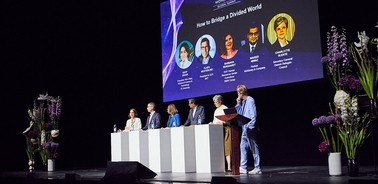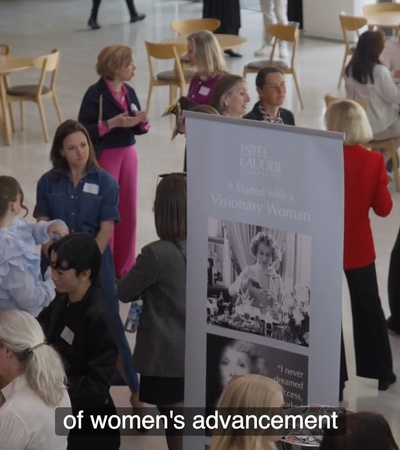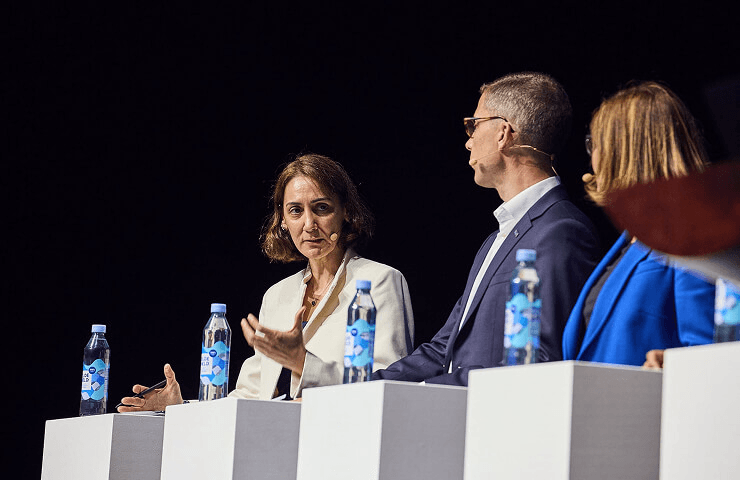- Home
- News And Events
- News
- Ie University Joins Womenomics 2025 In Copenhagen To Promote Inclusive Leadership And Innovation
IE University joins Womenomics 2025 in Copenhagen to promote inclusive leadership and innovation

The Womenomics Global Summit explores diversity, inclusion and women’s impact on the global economy.
IE University took part in the Womenomics Global Summit 2025, a leading international forum on inclusive leadership, innovation, and diversity, held on June 3rd at the Royal Danish Opera House in Copenhagen. Rafif Srour, Executive Vice Dean IE School of Science and Technology, alongside Mar Hurtado de Mendoza, Vice President for Global Recruitment and Marketing, and Ines Drieselmann, Vice President for Alumni and Careers. Together, contributed with their views on the challenges of inclusive leadership, technological transformation, and the future of equitable workplaces.
The summit brought together over 1.000 decision-makers, innovators, and changemakers from all over the world under the theme "Inclusive Leadership – Shaping Sustainable Workplaces." This year's gathering served as a reminder that countries and companies that stall or even reverse progress risk falling behind not just socially, but economically.
Representing IE School of Science and Technology, Executive Vice Dean Rafif Srour participated as a panelist in the high-level session "How to Bridge a Divided World." The discussion explored how inclusive leadership can help close societal divides in a fractured and increasingly complex world, offering insights on navigating uncertainty, building trust, and keeping inclusion at the core of effective leadership across both business and society.
"Leaders must bridge the gap between technological innovation and human upskilling," Rafif Srour said. Moderated by Clement Kjersgaard, the panel featured other experts such as Claes Westerlind, President & CEO of NKT, Barbara Burghardt, SVP, Human Resources Senior Executives at BMW Group, Naveed Niwaz, Partner at McKinsey & Company and Charlotte Slente, Secretary General of the Danish Refugee Council.
"As academic leaders, we are constantly asked to prepare students for jobs that do not exist yet, in a society that we cannot imagine. This requires us to have clarity of vision not only about the technology itself but its impact on society, courage to shake and question outdated systems and a constant need of recalibration, in terms of technologies, ethical dilemmas and digital innovation", stated Vice Dean Srour.
Mar Hurtado de Mendoza also emphasized the transformative role of universities in fostering a more inclusive society. "We're not just educational institutions—we're engines of change. With that comes a profound responsibility to drive the positive change we want to see in the world. When it comes to gender, our role is pivotal. We are committed to being the launchpad where women develop not just skills, but the confidence and connections necessary to drive and achieve their goals. Our involvement in Womenomics 2025 reflects this mission. We are actively building ecosystems of support that connect women to mentors, peers, and opportunities that align with their values and aspirations. We don't just open doors; we help women build the keys to unlock whatever future they envision for themselves", Hurtado de Mendoza stated.
"At IE University, we believe inclusive leadership is not just a value but a strategic imperative. Our global alumni and employer networks remind us daily that the future belongs to those who know how to lead across difference," added Ines Drieselmann. "Participating in Womenomics 2025 was a powerful reminder that advancing gender equity and innovation go hand in hand, and that education has a unique role to play in building more equitable, human-centered workplace."

